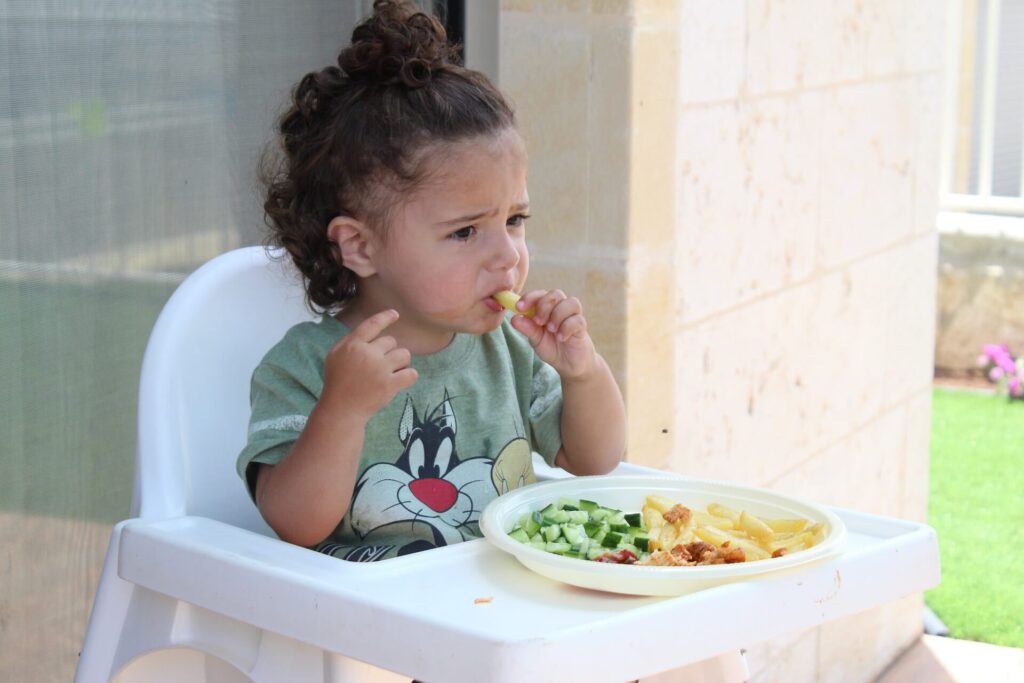
‘NO! NO!’ NO!’ screams your toddler. The words you’ve been dreading even before you steamed the broccoli.
In your calmest voice, you explain “Broccoli will make you stronger, greens are high in fibre and vitamins, which is great for you!”
“But it tastes yucky and I am not eating it!” She adamantly states for the third time, as your patience starts to wear thin and your dread materialises.
“I’M NOT HUNGRY AND I WANT TO GO AND PLAY” she shouts as she pushes away the plate, spilling half its contents.
“You WILL eat your BROCCOLI. And you will eat it right NOW. And you will not be getting any treats after this meal with a show like this, young lady.”
In a new pitch and matching the volume of your combative toddler, you find yourself in a position you can only lose – you vs. her. And as the tears start to roll down her face, mission broccoli is now well and truly an afterthought.
Welcome to our guide to help parents transform mealtime meltdowns into lovely lunches and delightful dinners.
A positive relationship with food early on can lead to better eating habits, physical and mental health and the development of key social skills.
But we know you know that already!
It can be an endless source of anxiety and worry when your child refuses to eat.
But what if you knew that it is perfectly natural for children to refuse to eat or even taste new foods before they accept it into their diets? And if your child is kicking up a fuss over mealtimes, then you are far from alone. According to Great Ormond Street Hospital (GOSH), up to a third of children around the age of two could be described as fussy eaters.
Knowing this still may not help when we find ourselves in a war of words with a stubborn toddler but it may help to bring a new perspective to the situation to avert a future stalemate.
We want to help fussy eaters naturally develop their relationship with food and in the process improve their emotional and behavioural wellbeing. To achieve this, it’s key to understand the roots of their refusal.
We want to help fussy eaters naturally develop their relationship with food and in the process improve their emotional and behavioural wellbeing.

What's the root?
Parental anxiety
You’re behind schedule whilst preparing dinner at the end of a long week and you still have a ton of things to do before bedtime. As you approach your little one, you have a flashback to when you last offered green beans and you’re suddenly fearful of the consequences of rejection. Sound familiar? Past failures often become self-fulfilling prophecies. The parental anxiety that we feel often manifests itself in unconscious cues that the child will pick up.
It can take up to 20 introductions before a child will accept a new food. Being aware of your anxiety and the process of introducing new food is vital to how things will play out at the dinner table.
Your diet
A parents intake of vegetables and fruits is the strongest predictor of a preschoolers intake of these foods. A child is like a sponge, soaking up your eating choices, behaviors and patterns and in turn mimicking them. If vegetables are an optional extra for you, then it will be for them too!
Strict parenting
Old school parenting as I call it, doesn’t always work! Broadly, an authoritarian approach to eating can be characterised demands, pressure to eat, using coercion, having greater restrictions and punishments alongside low responsiveness to a child’s needs or behaviours. This has been found to be counterintuitive at mealtimes. Studies say that the more authoritarian a parents approach toward mealtimes, the fewer fruits and vegetables actually get eaten. Five year old me can attest to this!
Life changes
Children are very sensitive to changes in their lives but are unable to communicate how they feel. Changes such as the birth of a new baby, moving house, a change of child-minder, starting playgroup or even something much smaller may affect their interactions with food.
You’re having a challenging time
Children are quick to notice if there are changes in your mood, if you are feeling upset or if there are problems in the family. Like a spidey-sense, they may behave badly when you are least able to cope. If you’re having problems try not blame yourself, but also do not blame your child either if they react with difficult behaviour.
How you’ve handled difficult behaviour before
Behavioral patterns can emerge based on past experiences. For example, if you’ve given your child a sweet treat in exchange for eating their food or even sitting down at the dinner table to start with, they may expect treats every time they play up.
Needing attention
Often linked to some of the above roots, your child might see a tantrum at dinner time as a way of getting your attention, even if it is for the wrong reasons.
A parents intake of vegetables and fruits is the strongest predictor of a preschoolers intake of these foods.

What can you do?
Don’t give up prematurely
Persevere with introducing healthy foods, keeping in mind that is natural for children to refuse new foods. It took me 25 years to appreciate okra!
Praise them
Give them encouragement for trying or even smelling the food and remember that their acceptance may be gradual. The more familiar they become, the more positive their association will be.
Try alternatives and a variety
We all have different preferences for food and that is completely natural. Rather than continue with one type of healthy food, try variations and alternatives e.g. green beans instead of broccoli or cucumbers instead of lettuce for my little one.
Try not to overreact
This can be difficult. When your child does something annoying time after time, your anger and frustration can build up. It’s impossible not to show your irritation at times, but try to stay calm. Move on to other things you can both enjoy or feel good about as soon as possible like what they learnt at nursery that day or the details of a memory of a when you had eaten similar food.
Be positive about the good things
When a child’s behaviour is difficult, the things they do well can be overlooked. Remember to give attention and tell your child when you’re pleased about something they’ve done. You can let your child know when you’re pleased by giving them attention for good behavior. Conversely, provide less attention to bad behavior.
Take an authoritative approach (vs authoritarian)
Which is to set reasonable rules and guidelines that are in the best interests of the child and that consider sensitivity to the child’s reactions. For example, if a child says she doesn’t want to eat broccoli, you might say: “You do not have to eat the broccoli if you don’t want to. There is plenty of food on the table to choose from”. This instantly removes the power struggle and changes the dynamic. It also removes pressure from the child and enables them to instead explore.
Satter’s Division of responsibility (sDOR) is a fantastic feeding method pioneered by the feeding therapist Ellyn Satter based on an authoritative parenting approach . It is a broad evidence based approach that defines both the responsibility of the parent and the child. In essence, it’s the parents role to lead with the what, when, and where of feeding. It is then left to the child to decide on which of the foods on offer and how much to eat. The rules provide structure while still allowing room for the child to explore, test, and begin the process of learning what constitutes acceptable behaviour.
Connect and engage with your child
When you notice them having a difficult time at the table by being Playful, Accepting, Curious and Empathetic (PACE) in your approach. PACE is a useful way of thinking, feeling, communicating and behaving that aims to make the child feel safe and build trust. It also allows for parents to try alternative routes to avoid the dreaded you vs them stalemate. You can learn more about PACE here.
Offer rewards, not bribes
You can help your child by rewarding them for good behaviour. For example, praise them or give them their favourite food for tea. If your child behaves well, tell them how pleased you are. Be specific. Say something like, “Well done for putting your toys back in the box when I asked you to”.
Do not give your child a reward before they’ve done what they were asked to do. That’s a bribe, not a reward.
Persevere with introducing healthy foods, keeping in mind that is natural for children to refuse new foods. It took me 25 years to appreciate okra!

Should I worry?
As long as your child eats some food from the 4 main food groups (fruit and vegetables; potatoes, bread, rice, pasta and other starchy carbohydrates; dairy or dairy alternatives; and beans, pulses and other proteins) you don’t need to worry.
Try not to focus on what your child eats in a day or whether they are eating everything at mealtimes but rather what they eat over a week. If your child is active, gaining weight and they seem well then they’re getting enough to eat. If this is not the case, we would advise you to seek medical help or to reach out to helplines (details below).
Further resources and extra help for fussy eating
- We have created a script of common objections children raise and suggestions for your approaches to overcome them utilising the PACE approach.
- For further details on how to implement Ellyn Satter’s Division of Responsibility, click here.
- Do not feel you have to cope alone. If you’re struggling with your child’s behaviour, talk to your health visitor – they will be happy to support you and suggest some new strategies to try. Visit the Family Lives website for parenting advice and support, or phone their free parents’ helpline on 0808 800 2222. Download the NSPCC’s guide to positive parenting.

